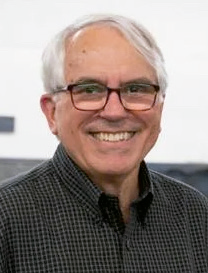‘A lot of businesses are taking a wait-and-see attitude’

Val Zanchuk, president of Graphicast — one of 149 companies that have signed up for New Hampshire’s new paid family and medical leave program, which began in January. (Hannah Schroeder/The Keene Sentinel) For Val Zanchuk, the decision to participate in New Hampshire’s new paid family and medical leave system came down to his feelings for the 25 people he employs at Graphicast.
The Jaffrey manufacturing firm is one of 149 companies that have signed up for the voluntary NH Paid Family and Medical Leave program, which was launched in January.
It can replace 60 percent of employees’ wages for up to 12 weeks to allow them to spend time with a newborn, care for a seriously ill family member or deal with their own medical conditions, among other qualifying reasons.
“We know from experience that people are going to have situations where they are going to take time off,” Zanchuk, president of Graphicast, said. “If they are taking that time off with some sort of income assurance versus not, how will that affect employees emotionally, psychologically?”
He said he’d like to avoid situations, for example, where employees might feel they have to go to work rather than be with a dying mother.
The company pays MetLife an annual overall premium of $3,000, which allows qualifying employees to have six weeks of paid leave. By participating in the program, the company can have its premium cut in half through a reduction in its state business enterprise tax.
Zanchuk regards this as a reasonable business expense that could ultimately help him recruit and retain employees in a tight labor market.
But he said he’s noticed that most companies have not yet joined the program.
“A lot of businesses are taking a wait-and-see attitude,” he said.
Richard Lavers, deputy commissioner of NH Employment Security, said he’d always like to see more organizations and people sign up but is glad that 149 companies employing 6,100 have done so, as well as 644 people who have purchased coverage on their own. The state has also put its nearly 9,000 permanent employees in the system.
Those covered by the program represent only a tiny fraction of the more than 600,000 workers in the state.
“It’s brand new and it’s voluntary, and we’re just three months in,” Lavers said. “There’s actually been quite a bit of demand, but for some employers, we may not have hit the time in their cycle when they are making benefit decisions.”
‘A new concept for NH’
According to the nonprofit Center for American Progress, 11 states including Massachusetts, have passed programs that legally guarantee workers the right to paid leave. Unlike those states, the programs in New Hampshire and Vermont provide a voluntary opportunity to purchase insurance coverage.
Andrea Chatfield is government affairs and legislative director on the HR State Council of New Hampshire.
Chatfield, an employment attorney who gives human resources seminars, said many in the business community remain wary.
“Paid family leave time is a new concept for New Hampshire,” she said. “The ones who would use the benefit the most — people starting new families — are having a hard time finding child care and are not in the workplace. But there are a lot of workers who have aging or sick parents who do see the need for this type of program.”
Chatfield also said some employers fear workers would take advantage of the benefit if it were offered.
She said the business community favored this voluntary opt-in system as opposed to earlier attempts to create a mandatory program, and that she hopes participation grows.
“I think it’s something that could be a good model for the rest of the country, because it would be on a voluntary basis,” she said. “Because I have a feeling that eventually, over time, if you don’t provide something, you’re going to be made to provide something.
“Paid family medical leave is coming and the question is, ‘What form do you want it in?’”
This article is being shared by partners in the Granite State News Collaborative. For more information, visit collaborativenh.org.